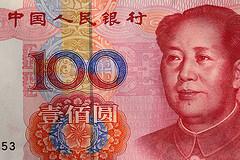
HSBC executes first RMB export settlement in Bangladesh
Bangladesh’s exports to China are expected to grow 12% in 2012.
In a statement, HSBC Bangladesh announced that it has executed its first Renminbi (RMB) denominated export settlement for Avant Garde Fashion Ltd, a company based in the Dhaka Export Processing Zone, to complete a sale to a Chinese customer. Cross-border trade settlements in RMB allow traders to reduce transaction costs, diversify their currency portfolio and hedge foreign exchange risk.
HSBC’s Global Connections report shows that growth in Chinese merchandise exports is expected to be most rapid to other economies in Asia. Bangladesh’s exports to China are expected to grow 12% in 2012, 15% annually between 2013-15, 14% annually between 2016-20 and 13% annually between 2021-30. The research reveals that China’s exports within Asia (ex Japan) are expected to expand 15% annually during 2013-2015, compared to 12% globally in the same time period.
Noel Quinn, Regional Head of Commercial Banking, Asia-Pacific, said: “China’s growth continues to drive intra-regional and global trade. By 2015, we expect a third (US2trn) of China’s trade to be settled in RMB and forecast that the currency will be fully convertible within the next five years. Bangladeshi businesses doing international trade with China are starting to realise the significant monetary benefits of settling their trade in RMB. HSBC Bangladesh has achieved a significant milestone which has been led by a very real demand for the use of RMB as a part of trade with China.”
A survey recently conducted by HSBC in China identified a clear cost advantage to businesses outside Mainland China that choose to settle their trade in RMB. Half of all Chinese corporates surveyed stated they were willing to offer better pricing or terms in return for using RMB to settle trade: 41% revealed they would be willing to offer discounts of up to 3% and 9% willing to offer even greater discounts.
Simon Constantinides, Regional Head of Global Trade and Receivables Finance, Asia-Pacific, said: “This transaction is further evidence of the development of the RMB as a global trade currency. HSBC forecasts that Renminbi will be a top-3 global trade currency in the next 5 years and we see trade between Bangladesh and other Asian countries, especially China, growing significantly in the near term. Bangladesh is an exciting emerging market with an interesting future as a solid trade hub within the region.”
HSBC has consistently been at the forefront of RMB developments both onshore and offshore. The Group has established RMB capabilities in over 50 markets worldwide, and issued the first international RMB bond in London earlier this year. In Mainland China, HSBC provides RMB cross-border settlement service across its entire branch network spanning 27 cities, the largest geographic coverage among all foreign banks in China. HSBC is well positioned to give businesses unrivalled access to China’s fast-emerging trade and investment currency by unlocking the international potential of RMB for customers across the world.























 Advertise
Advertise







